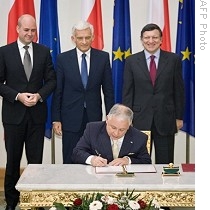Warsaw
10 October 2009
 |
| Polish President Lech Kaczynski signs EU's Lisbon Treaty at presidential palace in Warsaw, 10 Oct 2009 |
In a ceremony Saturday, Poland became the 26th country to ratify the Lisbon Treaty. Despite his personal antipathy towards the European Union, Polish President Lech Kaczynski signed the accord.
Polish Prime Minister Donald Tusk explained the government's reasoning.
Mr. Tusk says the treaty gives an added degree of security to the nations that have suffered the most, and Poland is one of those. He says Poland is now ready to be a responsible co-leader in Europe, and this signature is proof of that.
Earlier, President Kaczynski had said he would ratify the Lisbon Treaty only if Ireland did. When Irish voters approved the treaty earlier this month in a second referendum, he vowed to keep his word.
But President Kaczynski, a member of the far right Peace and Justice Party, has long shied away from deeper involvement with the European Union. Even during the signing ceremony he emphasized that the EU should remain a union of sovereign states.
Opinion polls show that most Poles support both the EU and the Lisbon Treaty, but a small minority still believes that a more powerful EU means loss of national self-determination.
There was a handful of protesters outside the Presidential Palace in Warsaw Saturday morning.
One man is adamant - he says the European Union just wants to dominate us, and to take away our ability to make decisions for ourselves.
Poland is the second-to-last EU member to sign the Lisbon Treaty, which must be ratified by all 27 member states before it can take effect.
Now the only signature missing is that of Czech President Vaclav Klaus, who has also expressed concerns about a more powerful EU. Mr. Klaus has said he wants an exemption included to safeguard the sovereignty of the judiciary before he agrees to sign.